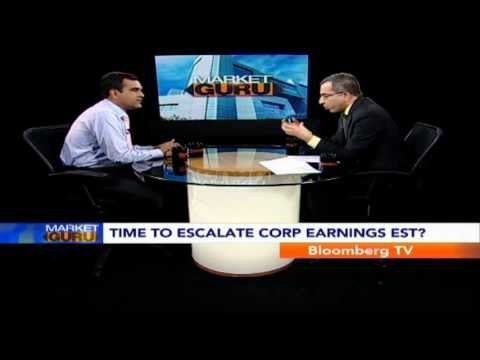Surprising Earnings Results_1
Post on: 11 Август, 2015 No Comment

When companies deliver their quarterly results. investors are watching — not just for improvements, but also for how these results compare to analysts’ estimates. If the company surprises the market with better-than-expected earnings. the stock usually jumps. On the other hand, disappointing results can cause the stock to tumble. In this article, we’ll show you how understanding surprises in earnings can help you as an investor cope with quarterly earnings seasons.
Surprise!
Earnings surprises occur when a company’s results differ from so-called consensus estimates. How earnings results measure up to Wall Street analysts’ estimates are important to the price of stocks. Keenly watched and widely disseminated, quarterly earnings announcements made by companies are key triggers for short-term stock price behavior.
Stocks of companies that surprise the market with better-than-expected quarterly numbers are swiftly ratcheted-up in value. By contrast, a negative earnings surprise will usually cause the stock to be sold off by the market, especially if there are high growth expectations factored into its share price and it is expensive relative to those expectations.
Even a strong set of quarterly results, if they fail to beat or exceed analysts’ expectations, can send a stock tumbling. Consider Advanced Micro Devices. For the first quarter of 2006, the chip technology company saw a delivered earnings per share (EPS) profit of $0.38 — 50% higher than the first quarter in the previous year. Nonetheless, because the consensus EPS expectations for Advanced Micro Devices were pegged at the higher profit of $0.43, the stock plummeted by 9% when the earnings results were released. (To learn more, read Types Of EPS . Earnings Forecasts: A Primer and How To Evaluate The Quality Of EPS .)
How Earnings Surprises Occur
Earnings surprises can be seen as a measure of analyst error. While a few analysts tend to make remarkably accurate forecasts, others miss earnings by a mile. There are plenty of good reasons why analysts’ estimates come in wide of the mark. These include:
1. Forecasting Is Difficult
For starters, forecasting is a tricky business. Companies are subject to hard-to-predict forces, and these can have a big impact on their financial performance. With only publicly-available information to rely on, it’s awfully difficult for analysts to predict precisely how many products a company will sell and the cost of doing business in the future. Expecting analysts to hit the bulls-eye with their earnings estimates may be unrealistic.
2. Herd Behavior
Research shows that analysts tend to exhibit herding behavior. shifting their forecasts over time to be more in line with their peers. A study by Robert Olsen, titled Implications Of Herding Behavior (1996) in the Financial Analysts Journal. shows that analysts tend to prefer not to make earnings predictions that differ greatly from consensus estimates for fear that they will be proved wrong. Unfortunately, the herd is not always correct.
3. Confirmed Optimists
Over-optimism increases the chance of analyst error. The trouble is, analysts’ earnings forecasts generally err on the high side rather than the low side. More often than not, analysts start the year estimating too high, and then spend the period revising their estimates downward.
Analysts prefer to remain positive on a stock for fear that if they get on a company’s wrong side they will be cut off from management and information flows. Brokerage houses are inclined to be optimistic to encourage investor clients to buy into stocks. According to Mark Bradshaw of HarvardBusinessSchool, stock analysts are persistently optimistic in their forecasts of corporate clients that issue equity and debt.
4. Managing Expectations
Companies are getting better at avoiding negative earnings surprises. Company executives can influence analysts’ expectations through pro-forma earnings forecasts or guidance information they provide at press conferences, conferences and other meetings they arrange. The goal is to manage analysts’ expectations to ensure earnings results and, at the very least, meet consensus estimates. (For further reading, check out Understanding Pro-Forma Earnings .)
Increasingly, companies will report bad news well ahead of earnings announcements. Management will try to get any unpleasant news out in the open so that there are no nasty surprises at report time. In fact, many companies now try to talk down expectations just enough so that there will be positive earnings surprise when results are announced.
Talking down expectations is getting so prevalent, it’s arguable that positive earnings are having less of an impact on share prices. Big public companies, such as General Electric, Microsoft and Walmart regularly beat analysts’ consensus estimates. Beating estimates by a penny or two no longer surprises the market.
In a bid to manage earnings, companies have been known to reserve extra earnings in a good quarter to inflate earnings in a future bad quarter. Companies anxious to hit aggressive analyst expectations may try to inflate earnings through easing credit policies, or stuffing customers with more product than they need. Even worse, the need to meet or beat consensus estimates has prompted some companies to turn to illegal accounting practices. (For more insight, see Earnings Guidance: The Good, The Bad And Good Riddance and Getting The Real Earnings .)
Conclusion
Quarterly earnings surprises can impact share prices — certainly in the short-run. If you are interested in how a stock moves after its quarterly results, it’s worth keeping track of surprises. But as an investor, you probably shouldn’t put too much stock into surprises as indicators of a company’s long-term investment prospects. In essence, surprises tell us about analysts’ ability to predict earnings and company’s ability to manage those predictions — neither of which says much about whether the company’s stock is worth buying.














